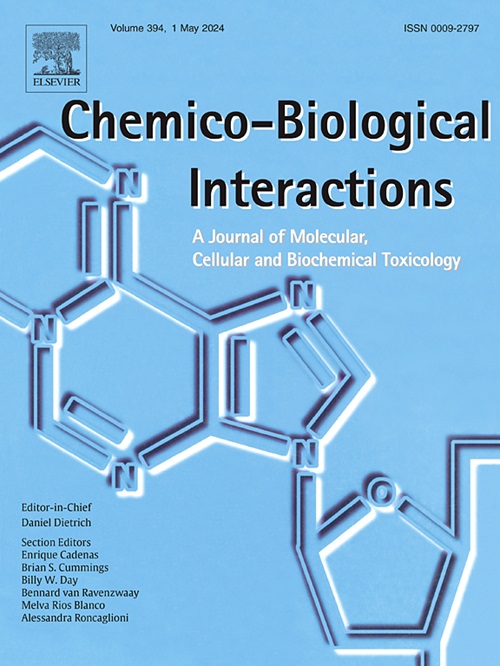新型选择性HDAC1抑制剂ZJH-1在去势抵抗性前列腺癌中显示出强大的抗肿瘤活性,可能涉及HSP90AA1。
IF 5.4
2区 医学
Q1 BIOCHEMISTRY & MOLECULAR BIOLOGY
引用次数: 0
摘要
组蛋白去乙酰化酶(HDAC)抑制剂正在被探索作为前列腺癌(PCa)的治疗方法,特别是治疗选择有限的去势抵抗型前列腺癌。本研究设计合成了一种新型羟酸盐型hdac1选择性抑制剂ZJH-1,并对其抗肿瘤效果和分子机制进行了系统评价。生化和亲和分析显示ZJH-1具有最高的HDAC1选择性,与PCa细胞中H3在Lys9/27位点的高乙酰化有关。ZJH-1通过双重机制表现出细胞毒性作用(在PC3细胞中IC50 = 65 nM,在患者来源的异种移植类器官(pdxo)中IC50 = 345 nM): 1)细胞周期调节,通过下调Cyclin D1诱导G1阻滞;2)内在凋亡诱导,通过caspase-3切割和Bax/Bcl-2比值升高来证明。通过降低MMP-2/MMP-9活性和逆转上皮-间质转化(EMT)标志物,ZJH-1也显示出影响转移相关过程的潜力。网络药理学分析预测HSP90AA1为ZJH-1的潜在对接靶点。此外,蛋白表达分析表明,ZJH-1上调失能同源物2相互作用蛋白(DAB2IP),下调热休克蛋白90AA1 (HSP90AA1)。在体内,ZJH-1 (20 mg/kg, i.p.p)显著减弱PC3异种移植模型的肿瘤生长(与对照组相比体积减少75%),未观察到明显的体重减轻或明显的毒副作用。这些发现表明,选择性HDAC1抑制剂ZJH-1作为PCa的潜在治疗方法值得进一步研究。本文章由计算机程序翻译,如有差异,请以英文原文为准。
The novel selective HDAC1 inhibitor ZJH-1 exhibits potent antitumor activity in castration-resistant prostate cancer, potentially involving HSP90AA1
Histone deacetylase (HDAC) inhibitors are being explored as a therapeutic approach for prostate cancer (PCa), particularly castration-resistant variants with limited treatment options. In this study, we designed and synthesized ZJH-1, a novel hydroxamate-based HDAC1-selective inhibitor, and systematically evaluated its anti-tumor efficacy and molecular mechanisms. Biochemical and affinity analyses showed ZJH-1 possesses the highest HDAC1 selectivity among isoforms, associated with H3 hyperacetylation at Lys9/27 in PCa cells. ZJH-1 demonstrated cytotoxic effects (IC50 = 65 nM in PC3 cells and 345 nM in patient-derived xenograft organoids (PDXOs)) via dual mechanisms: 1) cell cycle modulation, inducing G1 arrest through Cyclin D1 downregulation; and 2) intrinsic apoptosis induction, evidenced by caspase-3 cleavage and an elevated Bax/Bcl-2 ratio. ZJH-1 also showed potential to affect metastasis-related processes, as suggested by reduced activity of MMP-2/MMP-9 and reversed markers of epithelial-mesenchymal transition (EMT). Network pharmacology analysis predicted HSP90AA1 as a potential docking target of ZJH-1. Furthermore, protein expression analysis demonstrated that ZJH-1 upregulates disabled homolog 2 interacting protein (DAB2IP) and downregulates heat shock protein 90AA1 (HSP90AA1). In vivo, ZJH-1 (20 mg/kg, i.p.) significantly attenuated tumor growth in PC3 xenograft models (75 % volume reduction vs. controls) with no obvious weight loss or overt toxic side effects observed. These findings suggest that ZJH-1, a selective HDAC1 inhibitor, merits further investigation as a potential treatment for PCa.
求助全文
通过发布文献求助,成功后即可免费获取论文全文。
去求助
来源期刊
CiteScore
7.70
自引率
3.90%
发文量
410
审稿时长
36 days
期刊介绍:
Chemico-Biological Interactions publishes research reports and review articles that examine the molecular, cellular, and/or biochemical basis of toxicologically relevant outcomes. Special emphasis is placed on toxicological mechanisms associated with interactions between chemicals and biological systems. Outcomes may include all traditional endpoints caused by synthetic or naturally occurring chemicals, both in vivo and in vitro. Endpoints of interest include, but are not limited to carcinogenesis, mutagenesis, respiratory toxicology, neurotoxicology, reproductive and developmental toxicology, and immunotoxicology.

 求助内容:
求助内容: 应助结果提醒方式:
应助结果提醒方式:


